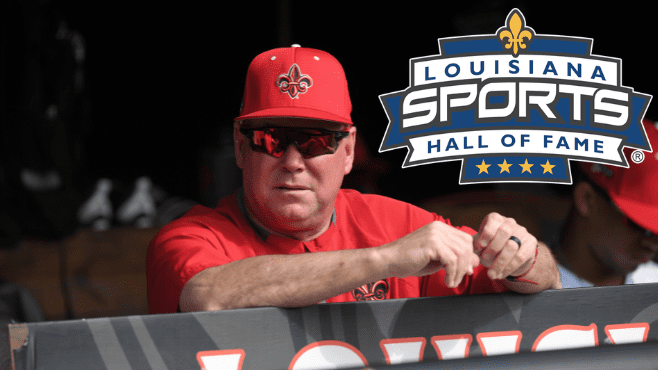
They go on and on, the “Robeisms” that are so famous to those who ever spent any time with Tony Robichaux.
“Work while you wait.” “Let the way you live your life define who you are.” “Glorify what’s important.” “Tough times allow you to show who you are.” “The real world doesn’t fix things for you.” “Too many people sit down when it’s time to stand up.” “Nothing is good or bad, it’s how you respond that makes it good or bad.”
Notice that none of these are tied directly to baseball, the sport to which Robichaux gave so much and the sport that gave him so much in return. There are obviously many that are baseball-specific – “This is a team sport until you hang a breaking ball with the bases loaded.” “We want guys that drink out of the hose, not the guy whose mommy is bringing him a Powerade in the third inning.” “Baseball is a game that will humble you if you don’t give it the respect it deserves.”
But the infinitely more important “Robeisms” had little to do with the game, and instead were aimed at helping people become the best version of themselves. For Robichaux, baseball was only the vehicle, something that could be used to lead, motivate, impact and inspire. To put it in familiar terms, it should be used to help people find their way around the bases before they’re called home.
“What you do should never be who you are,” the long-time coach was fond of saying, and no one ever epitomized that more. Anyone who thought of Tony Robichaux as only a baseball coach – albeit the most successful one in Louisiana history – was so regrettably mistaken.
Robichaux was called home much too early, felled by a heart attack on June 23, 2019, with further complications leading to his passing 11 days later at the young age of 57. His far-reaching baseball accomplishments earned him selection to the Louisiana Sports Hall of Fame in his first year on the ballot.
He is among 12 people in the LSHOF Class of 2022 to be honored June 23-25 in Natchitoches. For participation opportunities and more information, visit LaSportsHall.com or call 318-238-4255.
The “Robeisms” remain, along with a book that Robichaux was working on prior to his untimely death. Fortunately, his son Justin – who played for his father, spent time in the professional ranks and now fittingly serves as pitching coach for Louisiana’s national-power softball team – did not let the book’s ideals die with him.
“I had the unique perspective to pull from my father’s lifework to complete his story and journey,” the younger Robichaux said upon the completion and publishing of “The Real Game: Overcoming Life’s Personal and Professional Challenges.”
The book is not about baseball. Nowhere in it will you find proper bunting techniques or how to grip the curveball, even though Robichaux was renowned nationwide for his ability to develop pitchers. There’s plenty of baseball in it, but the game is once again a vehicle, a metaphor for life, a symbol for how to become a servant leader.
“Life’s personal and professional challenges are the real game, not baseball,” Robichaux said in one form or another on a regular basis. “It is a game, and the game should not be anyone’s identity.”
Statements like this would sound trite coming out of most mouths. For Robichaux, it was who he was.
“I’ve never met a man with more integrity,” said longtime UL radio announcer Jay Walker. “I never met a man with higher principles. His job, he said, was to take boys and make them men, and to take men and make them better husbands and father, and he did that. Every person who was ever in that program is better now because he touched them.”
It wasn’t just the hundreds of players that he mentored, 29 of whom earned All-America status and 60 who were drafted into professional baseball. Two men, both who served as assistant coaches and who went on to success as collegiate head coaches, are prime examples of what Robichaux meant to others.
John Szefc brought a Marist team to an NCAA regional at UL’s M. L. “Tigue” Moore Field in 2000, the year that Robichaux’s Ragin’ Cajuns reached the game’s summit at the College World Series. Robichaux never forgot how hard Szefc’s team played and the character he and his players showed, and three years later he invited Szefc to join his staff as his top assistant.
“He hired a guy from New York years later when I had no experience with that area,” said Szefc, now the head coach at Virginia Tech. “I was able to work on a national stage, and Tony game me that opportunity. As I look back, I was so very fortunate that chain of events took place, and none of that takes place without Tony Robichaux.”
Matt Deggs’ feelings are even more intense and emotional, after Robichaux brought him back into college baseball in 2012 after what is now a well-documented battle with alcoholism.
“I was a broken man that was by God’s grace brought back and healed,” Deggs said at an emotional press conference announcing that he would be the man to take the reins of the UL program not long after Robichaux’s passing. “Seven years ago, Coach saved my life. He saved my family. I was dead, folks. I was gone. Coach Robe gave me an opportunity when nobody else in the country would.”
Deggs, like Robichaux, is a published author. Many of the 28 stories in his “15 to 28: A Story of God’s Love, Power and Redemption” talk about the two years that Deggs served as Robichaux’s top assistant. The last of those years, in the 2014 season, the Ragin’ Cajuns were ranked No. 1 nationally late in the season, became easily the best offensive team in program history and came within one game of reaching the College World Series.
But not by surprise, his book is also not a baseball book. It’s a guide, a manual, and an instruction book for how to become a Hall of Fame man even without a 33-year coaching career and 1,177 wins.
“He was a much better man than he was a baseball coach, and make no mistake, he was a great baseball coach,” said Glenn Cecchini, his former UL roommate and now iconic prep baseball coach at Barbe High in Lake Charles. “He taught so many lessons about life. His winning on the field was just a by-product of him doing things right and teaching guys life lessons through baseball, really molding young men.”
“He would see guys for maybe five, 10 minutes, and yet he would make a significant impact on them,” said former Cajun catcher and long-time friend Ken Meyers. “They’d walk away thinking, ‘How does he live that kind of lifestyle?’ But that was who he was. He was very public with his beliefs, his morals, his values.”
The Crowley native was the seventh-winningest active coach in NCAA baseball at the time of his death. He still ranks in the top 40 all-time among Division I coaches, and only a handful of those had all their wins in their home state. His Cajun teams made 12 NCAA Regional and four Super Regional appearances along with the 2000 College World Series.
He’s the winningest coach – in any sport – in both UL and McNeese history, ironically after spending time at both schools as a pitcher during his playing career. His UL teams won 914 games along with seven Sun Belt Conference regular-season titles and four Sun Belt Tournament titles. That came on the heels of great success with the Cowboys: 263 wins in eight seasons (1987-94), the school’s first Southland Conference regular-season (1988) and tournament (1993) crowns (NCAA appearances both years), 37 All-Southland players, 13 MLB Draft picks, and a school-record 41 wins in 1994.
Those numbers were the main reason Robichaux was a “triple crown” Hall of Fame honoree in 2021-22. He was inducted into the UL Athletic Hall of Fame last fall, and into the American Baseball Coaches Association Hall of Fame in January, before now earning his home state’s greatest athletic honor.
But the numbers tell only a small part of the story.
“He broadened my horizons, really taught me what life was all about,” said former relief pitcher Kraig Schambough. “It was so much more than baseball.”
Schambough and 33 years’ worth of pitching staffs experienced that on a daily basis, since Robichaux served as his own pitching coach. But that didn’t mean his impact was limited to the mound. Jace Conrad, a first-team All-American second baseman for that 2014 team that went 58-10 and led the nation in hitting, said Robichaux’s influence is still with him almost a decade later.
“In the business I’m in, it’s extremely competitive so you fail a lot,” Conrad said. “When things aren’t going my way, besides my family, the one person I think about is Coach Robe. If I give up or I get down on myself, I know Coach Robe would get pissed off at me. That sticks with me on a daily basis. Not only do I want to make my family proud, I want to make Coach Robe proud.”
Conrad and scores of other players are responsible for the statue that now sits in front of Moore Field, one that fittingly was unveiled on the day that Deggs coached his first game in February of 2020. It’s a unique monument, unlike most celebratory statues since it shows Robichaux talking to and teaching a group of players, all on one knee and listening. It’s fitting for someone who was without peer as a teacher of life.
It’s also unique in that it was entirely funded by contributions by his former UL players, to the point that outside contributions were not accepted to cover its $160,000 cost. Former Cajun pitcher Phil Devey, who came from Canada to play college baseball and then returned to Acadiana after his professional career, was the driving force behind the memorial. Ironically, Devey was also honored as a UL Athletic Hall of Famer at last fall’s induction.
“We all know Coach Robe would have never wanted a statue,” he said. “Knowing it’s something he wouldn’t have wanted, how do you do it anyway. If it’s funded entirely by his former players and done in a way that represents him the best, not glorifying him but giving a message, we felt like Coach Robe would 100 percent approve.
“I was just so fortunate to be around him. To have him in my corner since I was 19, knowing he was a phone call away for anything at all … how do you thank a man for that? It’s just impossible.”
Written for LSWA by Dan McDonald.

